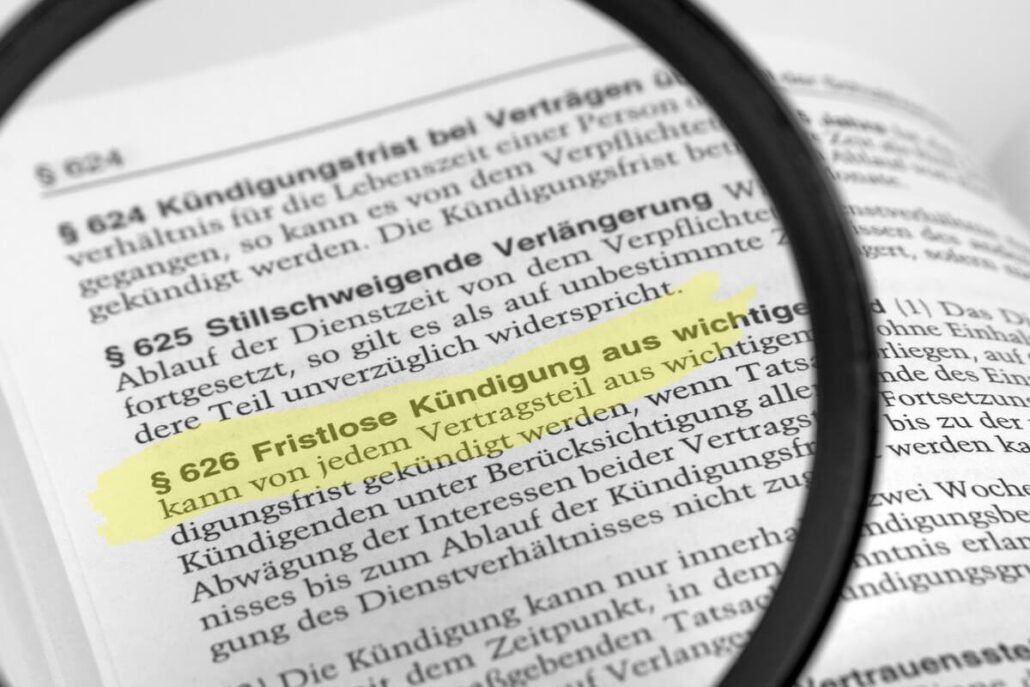

Even without a written employment contract, clear legal rules apply — especially when it comes to the notice period. The absence of a written agreement does not mean either side can terminate the job immediately. In Germany, the Civil Code (Bürgerliches Gesetzbuch – BGB) sets binding minimum notice periods that depend on the employee’s length of service. This article explains which notice periods apply if no written contract exists, how to calculate them, and what common mistakes to avoid.
Unfairly dismissed in Germany?
Check your severance pay now – you have only 3 weeks to preserve your severance package!
Key takeaways:
- Oral employment contracts are valid. A job exists even without written documentation. The main terms – parties, type of work, pay – must simply be clear.
- Termination still requires writing. Even if the contract was concluded orally, any resignation or dismissal must be in writing to be effective.
- Legal notice periods apply automatically. In the absence of a written or verifiable agreement, statutory rules govern how long the notice must be.
- Errors in calculation don’t void the dismissal. The termination usually takes effect at the next possible date under the correct notice period.
- Know your rights: Understanding statutory notice rules helps avoid early job loss and protects salary continuity.
Content
- Oral employment contracts are valid
- Notice period without contract: statutory rules apply
- The default: statutory notice periods under German law
- Calculating the notice period without a written contract
- Wrong notice period in an oral contract
- Extraordinary termination with an oral contract
- Notice period and separation agreement
- Frequently asked questions (FAQ)
Oral employment contracts are valid
An employment contract does not need to be in writing to be binding. Verbal agreements are legally enforceable as long as the essential elements – employer, employee, work duties, and pay – are defined.
Exception: Fixed-term employment contracts (“befristete Arbeitsverträge”) must always be concluded in writing. If a time limit is agreed only verbally, the contract automatically becomes permanent.
While an oral contract is legally valid, a written one offers clear advantages: it documents rights and duties precisely and avoids disputes about what was agreed.
Under the Evidence Act (“Nachweisgesetz”), employers must put the essential working conditions in writing and hand them to the employee. Failing to do so does not invalidate the employment – it’s merely a documentation duty, not a validity requirement. Many older or informal employment relationships in Germany still exist without written contracts, especially those established before the Evidence Act came into force.
Do you need help with German labor law?
Get a free initial consultation now – with an expert on German labor law!
Notice period without contract: statutory rules apply
If your employment contract does not specify a notice period, the law provides clear default rules. However, oral agreements or collective agreements may also influence how long the notice period actually is.
Oral agreements on notice periods are possible
Employer and employee can, in principle, verbally agree on a notice period that differs from the statutory one. Such an oral agreement is legally possible, but in practice hard to prove. If a dispute arises, the court usually assumes the statutory notice period applies.
Collective agreements may also apply
If no individual notice period was agreed, a collective bargaining agreement (“Tarifvertrag”) might still determine the notice period – but only if it applies to the employment relationship. A collective agreement applies when
- both employer and employee are members of the respective employers’ association and union, or
- the collective agreement has been declared generally binding, covering all employers and employees in that region or sector.
Employees can check this through the Federal Ministry of Labour and Social Affairs (BMAS) or ask their works council, trade union, or a labor-law attorney.
Whenever multiple rules overlap, the more favorable notice period for the employee applies – usually the longer one, since pay continues until the end of the notice.
Unfairly dismissed in Germany?
Check your severance pay now – you have only 3 weeks to preserve your severance package!
The default: statutory notice periods under German law
In most oral-contract situations, no specific period was agreed – so the statutory notice period in Section 622 BGB applies unless a collective agreement provides otherwise.
During the probationary period: 2 weeks, provided a probationary period was agreed.
After probation: 4 weeks to the 15th or end of a calendar month.
These are minimum periods binding for both sides. For employers, they lengthen with the employee’s tenure:
| Length of employment | Employer’s notice period |
| 2 years | 1 month to month-end |
| 5 years | 2 months to month-end |
| 8 years | 3 months to month-end |
| 10 years | 4 months to month-end |
| 12 years | 5 months to month-end |
| 15 years | 6 months to month-end |
| 20 years | 7 months to month-end |
These extended notice periods give long-term employees greater job security and planning stability.
Calculating the notice period without a written contract
The calculation method is identical whether the notice arises from law, contract, or collective agreement. The statutory base rule: four weeks’ notice to the 15th or the end of the month.
This means there must be at least 28 days between the day the termination reaches the employee and the effective end date. The calendar month’s length is irrelevant – only the four-week minimum counts.

How much severance pay are you entitled to? Calculate now!
- Calculate your individual severance pay for free
- Calculation of the standard payment up to a very high settlement
- Get a strategy to maximise your severance pay
Wrong notice period in an oral contract
If the notice letter does not clearly state the end date or the notice period was miscalculated, the termination is not automatically invalid. Instead, the law assumes the employment ends at the next possible lawful date, provided the party giving notice intended to terminate properly.
Courts generally interpret unclear or incorrect periods this way. However, if you suspect your notice period was calculated incorrectly, you should seek legal advice immediately to determine whether a dismissal protection claim (“Kündigungsschutzklage”) is worthwhile.
You must file a dismissal protection claim within three weeks after receiving notice. Miss this deadline, and the termination becomes legally effective — even if the notice period was too short.
If you do not file within the three-week period, the termination stands and the employment (and salary) ends earlier than it should have. Whether to sue depends on the individual case. In some situations, out-of-court negotiation can correct the notice date, but the three-week deadline still applies.
Extraordinary termination with an oral contract
Apart from ordinary termination with notice, both sides may end an oral employment relationship extraordinarily (immediately) if there are serious reasons that make continued cooperation unreasonable.
Typical examples include:
- severe breaches of duty,
- loss of trust, or
- repeated misconduct after prior warning.
Immediate termination must always be in writing and occur within two weeks after learning of the decisive facts.2
Notice period and separation agreement
An oral employment relationship can only end through a written termination or a written separation agreement (“Aufhebungsvertrag”).3
In a separation agreement, no statutory notice period has to be observed. However, caution is needed: if the employee has no follow-up job and applies for unemployment benefits, the Employment Agency may suspend payments until the ordinary notice period would have expired. In addition, the agency can impose a waiting or sanction period (“Sperrzeit”), reducing benefits for several weeks.
Still, shortening the notice period through a separation agreement can make sense – for example, to avoid workplace conflict or enable a quick job change.

Free initial consultation with a specialist lawyer
- 15min free initial consultation with a lawyer
- Prompt online appointment via Calendly or quick call-back
- Strategy for negotiating your severance pay




